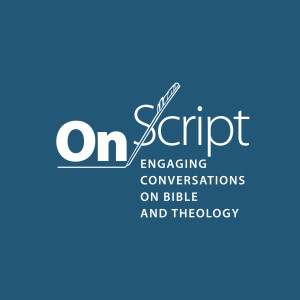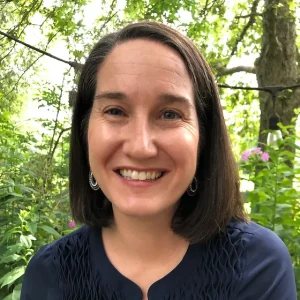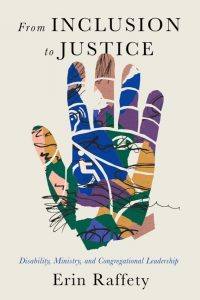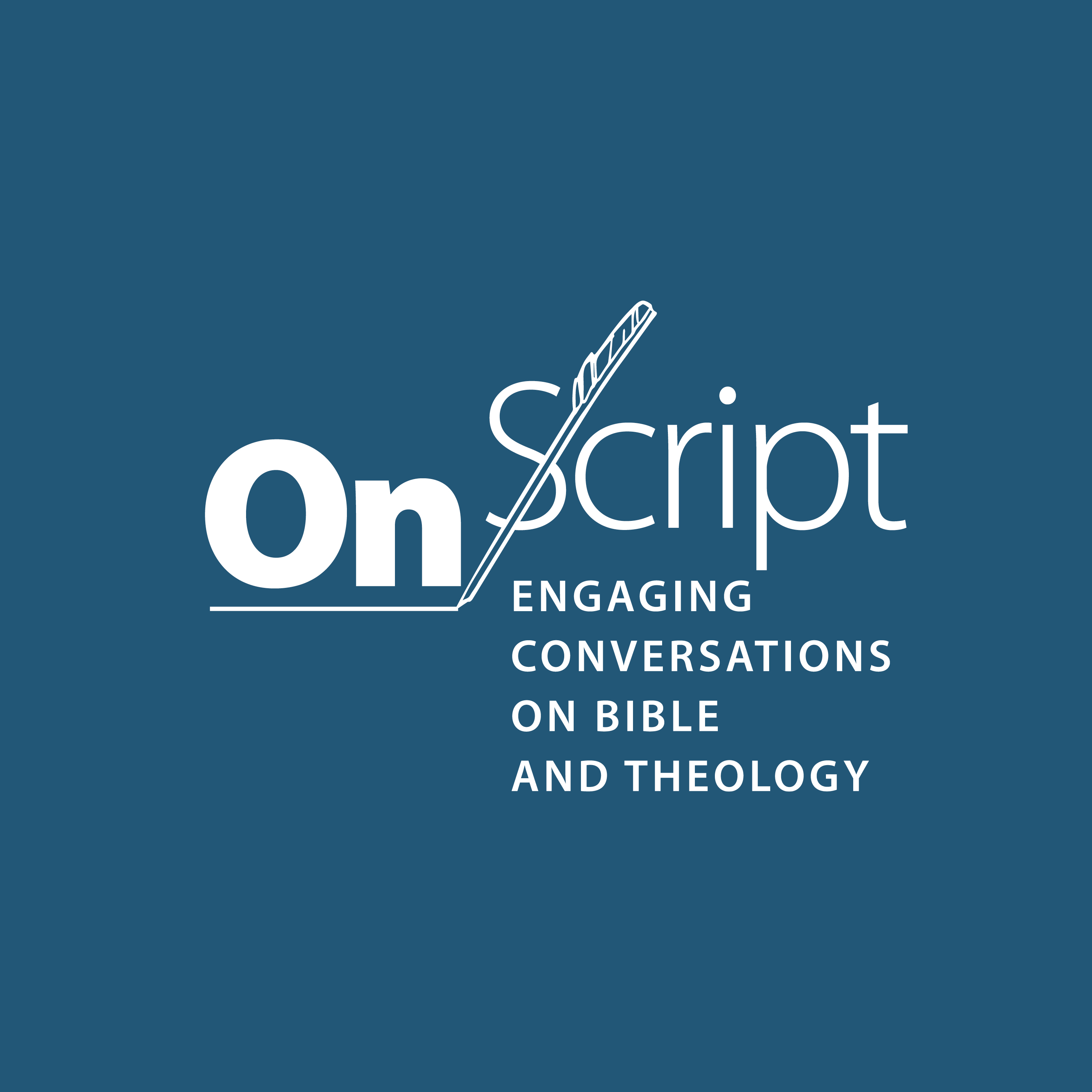Episodes

Friday Nov 10, 2023
Jenny Matheny - The Violence of Judges and Ruth’s Response
Friday Nov 10, 2023
Friday Nov 10, 2023
 Episode: What happens if you read Ruth and Judges together? What might Ruth say to the violence against women in Judges? Jenny Matheny discusses these questions and more (like how not to go hiking in Waco).
Episode: What happens if you read Ruth and Judges together? What might Ruth say to the violence against women in Judges? Jenny Matheny discusses these questions and more (like how not to go hiking in Waco).
Guest: Dr. Jenny Matheny is Associate Professor of Christian Studies at Truett Theological Seminary at Baylor University. Jenny has wide-ranging interests in gender studies, trauma studies, and areas like dress hermeneutics. She's the author of Joshua, in the Illustrated Hebrew-English Old Testament Series (GlossaHouse, 2019), Judges 19–21 and Ruth: Canon as a Voice of Answerability (Brill, 2022), and has two forthcoming books, Ḥesed and the Core of Old Testament Theology (Baker Academic, forthcoming) and Clothing, Dress, and Nudity in the Five Scrolls (Oxford University Press, forthcoming). 
Give: Visit our Donate Page if you want to help OnScript continue by becoming a regular donor.
Live Event! If you’d like to attend our live event in San Antonio on Nov 19, click HERE.

Thursday Oct 26, 2023
Lisa Powell - The Disabled God
Thursday Oct 26, 2023
Thursday Oct 26, 2023
 Episode: Lisa Powell discusses the Trinity and eschatological body through the lens of disability. The episode discusses insights from her book The Disabled God Revisited (T&T Clark).
Episode: Lisa Powell discusses the Trinity and eschatological body through the lens of disability. The episode discusses insights from her book The Disabled God Revisited (T&T Clark).
Guest: Lisa Powell is Professor of Theology at St. Ambrose University, and is the author of The Disabled God Revisited: Trinity, Christology, and Liberation (T&T Clark, 2023) and Inconclusive Theologies: Sor Juana, Kierkegaard, and Theological Discourse (Mercer: Mercer University Press, 2013).
Give: Visit our Donate Page if you want to help OnScript continue by becoming a regular donor.
Live Event! If you'd like to attend our live event in San Antonio on Nov 19, click HERE.

Wednesday Oct 11, 2023
Erin Raffety - From Inclusion to Justice
Wednesday Oct 11, 2023
Wednesday Oct 11, 2023
 Episode: In this episode, co-host Amy Hughes speaks with Erin Raffety about her ethnographic and practical theological research into what it looks like for congregations to move away from an "inclusion" model for people with disabilities to a "justice" model with people with disabilities.
Episode: In this episode, co-host Amy Hughes speaks with Erin Raffety about her ethnographic and practical theological research into what it looks like for congregations to move away from an "inclusion" model for people with disabilities to a "justice" model with people with disabilities.
Guest: Dr. Erin Raffety is a cultural anthropologist, a Presbyterian pastor, and an ethnographic researcher who has studied foster families in China, Christian congregations in the United States, and people with disabilities around the world. Raffety teaches and researches at Princeton Theological Seminary and Princeton University. Her most recent book, discussed in this episode, is From Inclusion to Justice: Disability, Ministry, and Congregational Leadership (Baylor), explores the importance of nurturing and receiving the ministry of people with disabilities in the church. Erin is an ordained pastor in the Presbyterian Church (USA), holds a PhD in cultural anthropology from Princeton University, and is a proud parent of a daughter with multiple disabilities. (adapted from Erin's website). 
Give: Visit our Donate Page if you want to help OnScript continue by becoming a regular donor.

Thursday Sep 28, 2023
Matthew Novenson – Paul, Then and Now
Thursday Sep 28, 2023
Thursday Sep 28, 2023
Episode: Erin sits down with Matthew Novenson for a lively conversation on the weirdness of Paul, theological and historical approaches, first-century Judaism, and a range of other topics covered in Matt's new book of collected essays, Paul, Then and Now (Eerdmans, 2022). This is Matt's second appearance on OnScript. You can also tune-in to an earlier OnScript conversation on The Grammar of Messianism (Oxford, 2017).
 Guest: Matthew V. Novenson holds a PhD from Princeton Theological Seminary, and is Senior Lecturer in New Testament and Christian Origins at the University of Edinburgh. He has published extensively on Messianism, first-century Judaism, and has emerged as a leading scholar in Pauline studies. Matt's other books include Christ Among the Messiahs, and The Grammar of Messianism. and he has also recently edited the very fine Oxford Handbook of Pauline Studies (OUP, 2022), which is an essential resource for students.
Guest: Matthew V. Novenson holds a PhD from Princeton Theological Seminary, and is Senior Lecturer in New Testament and Christian Origins at the University of Edinburgh. He has published extensively on Messianism, first-century Judaism, and has emerged as a leading scholar in Pauline studies. Matt's other books include Christ Among the Messiahs, and The Grammar of Messianism. and he has also recently edited the very fine Oxford Handbook of Pauline Studies (OUP, 2022), which is an essential resource for students.
 Book: (from the publisher's website: Reckoning with the hermeneutical struggle to make sense of Paul as both a historical figure and a canonical muse. Matthew Novenson has become a leading advocate for the continuing relevance of historical-critical readings of Paul even as some New Testament scholars have turned to purely theological or political approaches. In this collection of a decade’s worth of essays, Novenson puts contextual understandings of Paul’s letters into conversation with their Christian reception history.
Book: (from the publisher's website: Reckoning with the hermeneutical struggle to make sense of Paul as both a historical figure and a canonical muse. Matthew Novenson has become a leading advocate for the continuing relevance of historical-critical readings of Paul even as some New Testament scholars have turned to purely theological or political approaches. In this collection of a decade’s worth of essays, Novenson puts contextual understandings of Paul’s letters into conversation with their Christian reception history.
Give: Visit our Donate Page if you want to help OnScript continue by becoming a regular donor.

Monday Sep 18, 2023
Wolf Gruner - Jewish Resistance in Hitler’s Germany
Monday Sep 18, 2023
Monday Sep 18, 2023
 Episode: Gruner's work explores the lives of ordinary Jewish people who lived in Nazi Germany and resisted persecution. From defacing Nazi symbols to bold defiance Gruner explores the complex and fraught nature of Jewish opposition to Nazi policies, attacks, and hatred, and draws insights from the 12 years of archival research behind his book Resisters: How Ordinary Jews Fought Persecution in Hitler's Germany (Yale University Press, 2023).
Episode: Gruner's work explores the lives of ordinary Jewish people who lived in Nazi Germany and resisted persecution. From defacing Nazi symbols to bold defiance Gruner explores the complex and fraught nature of Jewish opposition to Nazi policies, attacks, and hatred, and draws insights from the 12 years of archival research behind his book Resisters: How Ordinary Jews Fought Persecution in Hitler's Germany (Yale University Press, 2023).
Guest: Wolf Gruner is the Shapell Guerin Chair in Jewish Studies and professor of history at the University of Southern California. He is the founding director of the USC Dornsife Center for Advanced Genocide Research, and the author of ten books on the Holocaust, including The Holocaust in Bohemia and Moravia, Jewish Forced Labor Under the Nazis, and many others, including the book under discussion in this episode, Resisters: How Ordinary Jews Fought Persecution in Hitler's Germany (Yale University Press, 2023). He lives in Los Angeles, CA. He's a member of the Academic Committee of the US Holocaust Memorial Museum in Washington DC, and is co-founder of the Consortium of Higher Education Centers for Holocaust, Genocide and Human Rights Studies. 
Give: Visit our Donate Page if you want to help OnScript continue by becoming a regular donor.

Wednesday Sep 06, 2023
Matt Lynch - Flood and Fury (on Old Testament Violence)
Wednesday Sep 06, 2023
Wednesday Sep 06, 2023
 Episode: Chris Tilling talks with Matt Lynch about Old Testament violence. They take a deep dive into ... the flood story in Genesis then traverse the Promised Land to consider the plight of the Canaanites. Matt argues that the complex problem of violence needs to meet with a nuanced reading of the Old Testament, all while holding onto the Bible's central claims about divine mercy. The discussion relates to Matt's recent book Flood and Fury: Old Testament Violence and the Shalom of God (IVP, 2023).
Episode: Chris Tilling talks with Matt Lynch about Old Testament violence. They take a deep dive into ... the flood story in Genesis then traverse the Promised Land to consider the plight of the Canaanites. Matt argues that the complex problem of violence needs to meet with a nuanced reading of the Old Testament, all while holding onto the Bible's central claims about divine mercy. The discussion relates to Matt's recent book Flood and Fury: Old Testament Violence and the Shalom of God (IVP, 2023).
Guest: Matt Lynch is Associate Professor of Old Testament at Regent College, and a co-founder and host on OnScript! He's the author of First Isaiah and the Disappearance of the Gods (Eisenbrauns), Portraying Violence in the Hebrew Bible: A Literary and Cultural Study (Cambridge, 2020), and Monotheism and Institutions in the Book of Chronicles: Temple, Priesthood, and Kingship in Post-Exilic Perspective (Mohr Siebeck, 2014). His most recent book is Flood and Fury: Old Testament Violence and the Shalom of God (IVP, 2023).

Give: Visit our Donate Page if you want to help OnScript continue by becoming a regular donor.

Monday Aug 07, 2023
Stanley Porter and Bryan Dyer - Origins of New Testament Christology
Monday Aug 07, 2023
Monday Aug 07, 2023
 Episode: Who is this man? Questions about Jesus are fascinating and perennial. Stanley Porter and Bryan Dyer team up to explore how the New Testament deployed diverse traditions--Jesus as passover lamb, savior, prophet, last Adam, messiah, and many others--in order to answer foundational questions about Jesus. Discover how background studies can enhance Jesus and the New Testament rather than reduce them. Co-hosted by Matt Bates.
Episode: Who is this man? Questions about Jesus are fascinating and perennial. Stanley Porter and Bryan Dyer team up to explore how the New Testament deployed diverse traditions--Jesus as passover lamb, savior, prophet, last Adam, messiah, and many others--in order to answer foundational questions about Jesus. Discover how background studies can enhance Jesus and the New Testament rather than reduce them. Co-hosted by Matt Bates.
The Book: Stanley E. Porter and Bryan R. Dyer, Origins of New Testament Christology: An Introduction to the Traditions and Titles Applied to Jesus (Grand Rapids: Baker Academic, 2023). The early followers of Jesus drew from Jewish and Greco-Roman traditions and titles to help them understand and articulate who Jesus was. This book opens a window into the Christology of the first century by helping readers understand the eleven most significant titles for Jesus in the New Testament: Lord, Son of Man, Messiah, Prophet, Suffering Servant, Son of God, Last Adam, Passover Lamb, Savior, Word, and High Priest. The authors trace the history of each title in the Old Testament, Second Temple literature, and Greco-Roman literature and look at the context in which the New Testament writers retrieved these traditions to communicate their understanding of Christ. The result is a robust portrait that is closely tied to the sacred traditions of Israel and beyond that took on new significance in light of Jesus Christ. This accessible and up-to-date exegetical study defends an early "high" Christology and argues that the titles of Jesus invariably point to an understanding of Jesus as God. In the process, it will help readers appreciate the biblical witness to the person of Jesus. (Publisher's description).
 Stanley Porter has a number of different titles at McMaster Divinity College (Hamilton, Ontario). Stan is the President and Dean, Professor of New Testament, and Roy A. Hope Chair in Christian Worldview. He has written and edited many books. Some of his most well-known work pertains to linguistics with respect to NT Greek.
Stanley Porter has a number of different titles at McMaster Divinity College (Hamilton, Ontario). Stan is the President and Dean, Professor of New Testament, and Roy A. Hope Chair in Christian Worldview. He has written and edited many books. Some of his most well-known work pertains to linguistics with respect to NT Greek.
Bryan Dyer holds a PhD from McMaster Divinity College in New Testament and is acquisitions editor at Baker Academic. Bryan is also a part-time faculty member of religion at Calvin University in Grand Rapids, Michigan. He is the co-editor of numerous volumes and the author of a monograph on Hebrews, Suffering in the Face of Death (T&T Clark).
OnScript's Review: The Christology of the New Testament relates to its Jewish and Greco-Roman environment in complex ways. Some studies reduce Jesus in light of his background. Porter and Dyer have done the opposite. As they uncover each facet, an ever richer portrait of Jesus emerges. Students and scholars alike will appreciate its clarity, organization, up-to-date scholarship, and wisdom. -- Matthew W. Bates, author of The Birth of the Trinity; Professor of Theology, Quincy University
Give: Visit our Donate Page if you want to help OnScript continue by becoming a regular donor.

Wednesday Jul 19, 2023
Ted Smith - The End of Theological Education
Wednesday Jul 19, 2023
Wednesday Jul 19, 2023
 Episode: "We're in the midst of an unraveling". So argues Ted Smith about the shift in the ways that people relate and the end of theological education as it's typically conceived. Smith traces the historical roots of this social shift and the ways that education, institutions, and church ministry are changing. This is not a time for despair, however, because God longs to be known. The unraveling can be revelatory.
Episode: "We're in the midst of an unraveling". So argues Ted Smith about the shift in the ways that people relate and the end of theological education as it's typically conceived. Smith traces the historical roots of this social shift and the ways that education, institutions, and church ministry are changing. This is not a time for despair, however, because God longs to be known. The unraveling can be revelatory.
Guest: Ted A. Smith is Charles Howard Candler Professor of Divinity and Associate Dean of Faculty at Emory University. He's the author of three books: The End of Theological Education (Eerdmans, 2023), Weird John Brown (Stanford, 2015), and The New Measures (Cambridge, 2007). Together these books try to think theologically about core American Protestant institutions, practices, values, and rhetoric in a time when they are unraveling. Smith has also edited books on sexuality and ordination, contemporary issues in preaching, and economic inequality, along with a series of books on theological education. 
Give: Visit our Donate Page if you want to help OnScript continue by becoming a regular donor.

Friday Jul 07, 2023
Brandon Smith - The Trinity in the Book of Revelation
Friday Jul 07, 2023
Friday Jul 07, 2023
 Episode: Revelation is a mysterious book, shrouded in symbol and rich in Old Testament allusions. What does it mean for our present and future? And more importantly, what does it teach us about God and God's unfolding rule? Brandon Smith shows us that, surprisingly, Revelation has much to teach us about the Trinity. And once we discover the Trinity's mission, we are better equipped to read Revelation well and to find our own place in the story. Co-hosted by Matt Bates.
Episode: Revelation is a mysterious book, shrouded in symbol and rich in Old Testament allusions. What does it mean for our present and future? And more importantly, what does it teach us about God and God's unfolding rule? Brandon Smith shows us that, surprisingly, Revelation has much to teach us about the Trinity. And once we discover the Trinity's mission, we are better equipped to read Revelation well and to find our own place in the story. Co-hosted by Matt Bates.
 The Book: Brandon D. Smith, The Trinity in the Book of Revelation: Seeing Father, Son, and Holy Spirit in John's Apocalypse (Downers Grove: IVP Academic, 2022). How should we read the book of Revelation? Interpreting Scripture faithfully is a challenge with regard to any text and for any reader of the Bible. But perhaps no text confronts and confuses readers as much as the book of Revelation. With its vivid imagery and rich prophetic language, John's Apocalypse provokes and stirs our imaginations. Theologian and biblical scholar Brandon Smith brings clarity to this question by reading the book of Revelation primarily as John's vision of the triune God. In conversation with early church theologians, including Irenaeus, Origen, Athanasius, and the Cappadocians, as well as modern biblical scholarship, Smith shows how John's vision can help us worship the one God who is Father, Son, and Holy Spirit. (Publisher's description, abridged).
The Book: Brandon D. Smith, The Trinity in the Book of Revelation: Seeing Father, Son, and Holy Spirit in John's Apocalypse (Downers Grove: IVP Academic, 2022). How should we read the book of Revelation? Interpreting Scripture faithfully is a challenge with regard to any text and for any reader of the Bible. But perhaps no text confronts and confuses readers as much as the book of Revelation. With its vivid imagery and rich prophetic language, John's Apocalypse provokes and stirs our imaginations. Theologian and biblical scholar Brandon Smith brings clarity to this question by reading the book of Revelation primarily as John's vision of the triune God. In conversation with early church theologians, including Irenaeus, Origen, Athanasius, and the Cappadocians, as well as modern biblical scholarship, Smith shows how John's vision can help us worship the one God who is Father, Son, and Holy Spirit. (Publisher's description, abridged).
Guest: Brandon D. Smith is Assistant Professor of Theology and New Testament at Cedarville University, a Christian University in Ohio. Smith holds a Ph.D. in Theology from Ridley College (Melbourne), M.A. in Biblical and Theological Studies from Criswell College, and a B.A. in Biblical Studies from Dallas Baptist University. Smith is the author of several books. He has also written The Biblical Trinity (Lexham) and has a forthcoming book on hermeneutics that I’ve already read and can recommend, Taught by God (B&H Academic). Brandon is also the founder and the co-host of the podcast Church Grammar.
OnScript's Review: Brandon Smith offers a robust description of how Revelation contributed to the early church's Trinitarian theology and how Revelation can be better understood in light of the doctrine of the Trinity. What emerges is a beautiful portrait of the one God--Father, Son, and Holy Spirit--as the one God works to make all things new. Highly recommended. -- Matthew W. Bates, author of The Birth of the Trinity; professor of theology, Quincy University
Give: Visit our Donate Page if you want to help OnScript continue by becoming a regular donor.

Tuesday Jun 20, 2023
Kyle Keimer - Hezekiah Prepares for War
Tuesday Jun 20, 2023
Tuesday Jun 20, 2023
 Episode: Biblical World co-host Kyle Keimer discusses his research on King Hezekiah's preparations for the Assyrian attack in 701 BCE. How do archaeologists determine the nature and extent of Hezekiah's defensive network? Did the Judeans use fire signals? How did the king prepare for war (and pay for it)? Listen in for a fascinating discussion of Keimer's archaeological, biblical, and geographical thoughts on this crucial event in Judah's history. This episode is cross-listed with our Biblical World podcast.
Episode: Biblical World co-host Kyle Keimer discusses his research on King Hezekiah's preparations for the Assyrian attack in 701 BCE. How do archaeologists determine the nature and extent of Hezekiah's defensive network? Did the Judeans use fire signals? How did the king prepare for war (and pay for it)? Listen in for a fascinating discussion of Keimer's archaeological, biblical, and geographical thoughts on this crucial event in Judah's history. This episode is cross-listed with our Biblical World podcast.
Guest: Kyle Keimer is Senior Research Fellow in the Department of History and Archaeology at Macquarie University, where he was Senior Lecturer in Archaeology, History, and Language of Ancient Israel. He also lectures at Jerusalem University College. For over 20 years he has been excavating in Israel and Cyprus and was co-director of the Khirbet el-Rai excavations. He loves digging as much as he loves working with ancient texts, especially the books of 1-2 Samuel and Isaiah. His research currently focuses on the early Israelite monarchy in text and archaeology. He’s co-edited Registers and Modes of Communication in the Ancient Near East (Routledge) and The Ancient Israelite World (Routledge), and he's published articles in various journals. His UCLA Ph.D. dissertation was on "The Socioeconomic Impact of Hezekiah’s Preparations for Rebellion."
Give: Help support OnScript’s Biblical World as we grow and develop. Click HERE.

